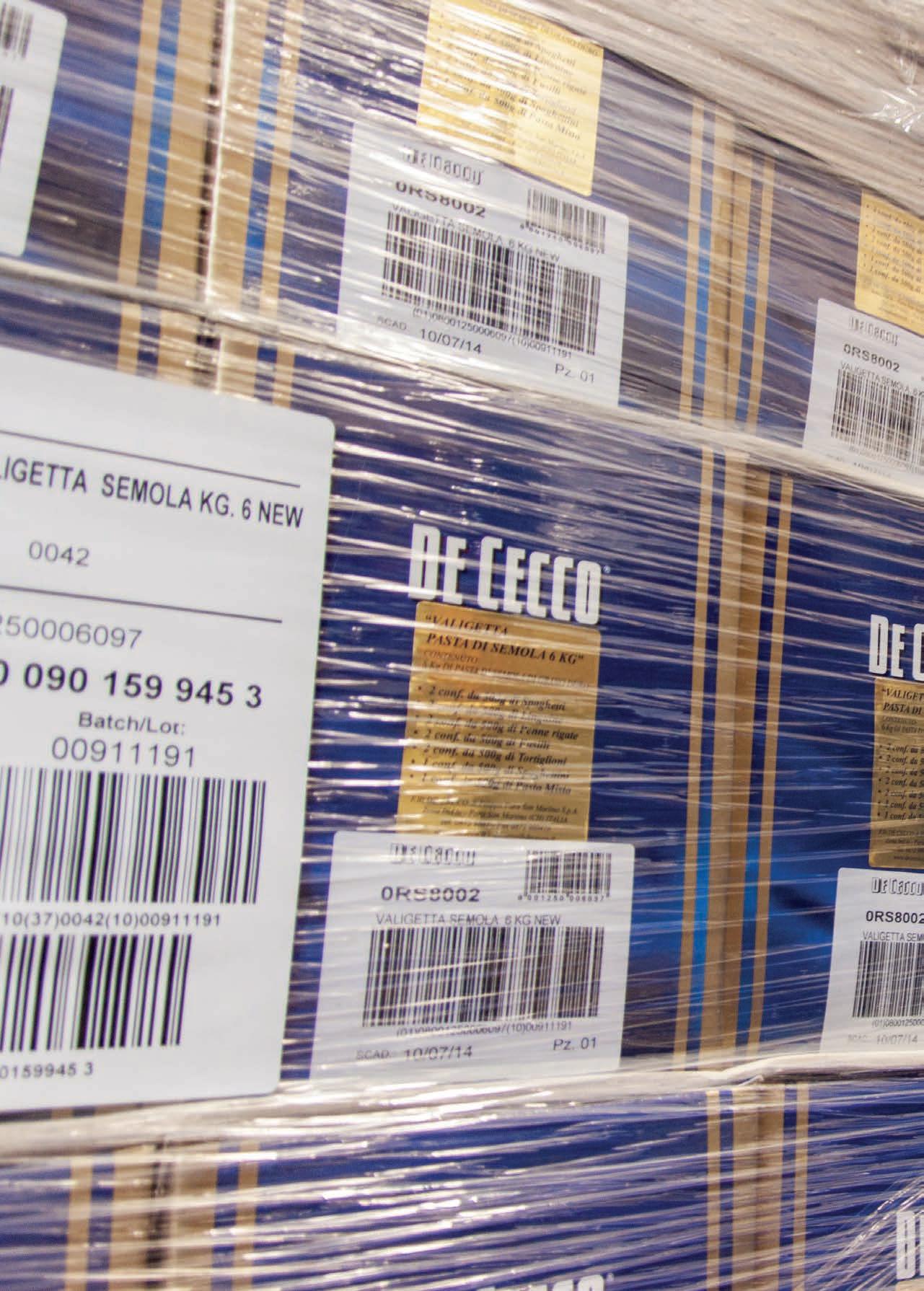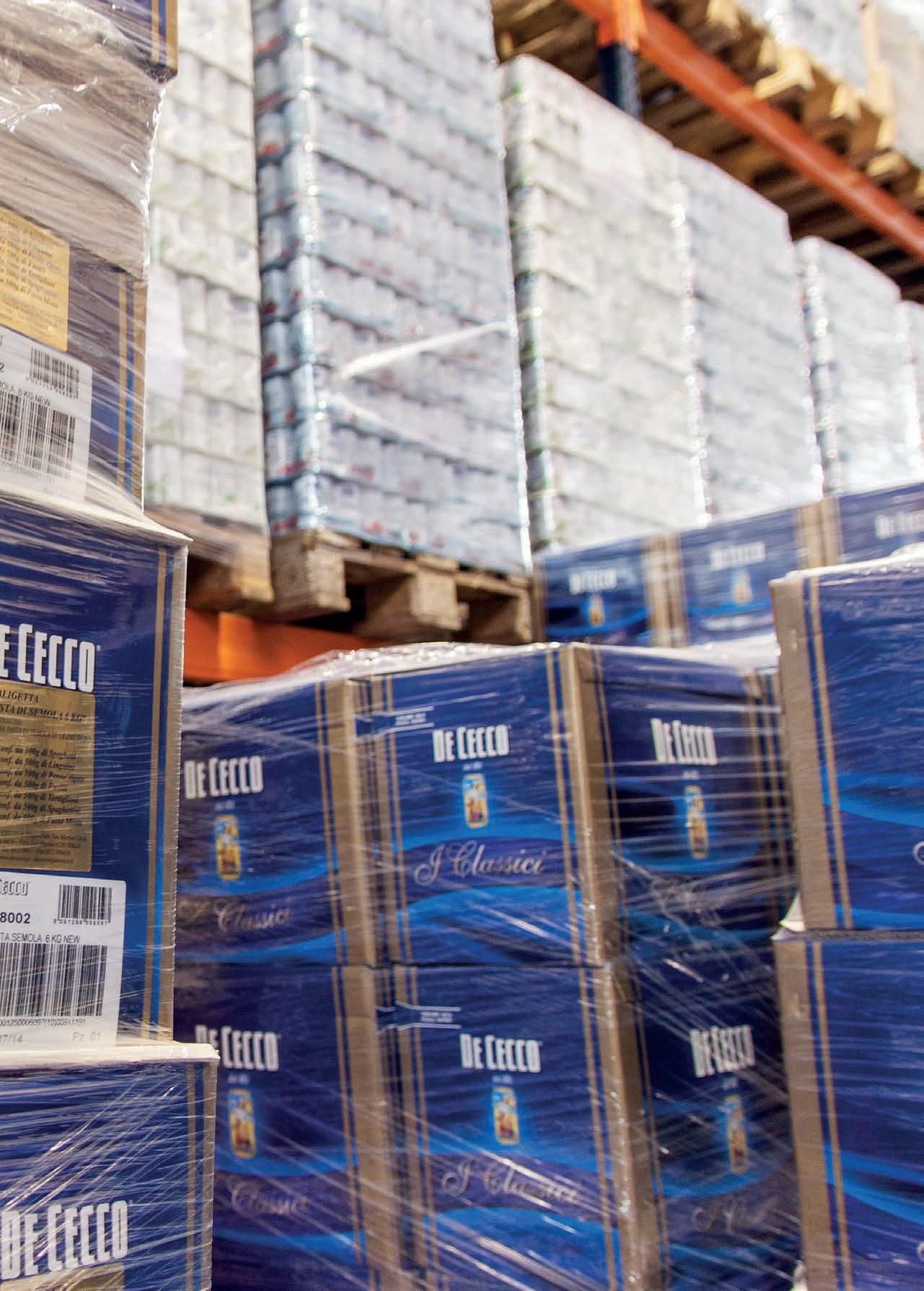
9 minute read
In 1832, His Majesty Ferdinand II crossed Abruzzo Citra and stopped off at Fara San Martino De Cecco e Banco Alimentare uniti nel nome della solidarietà De Cecco and Banco Alimentare together in the name of solidarity
De Cecco e Banco Alimentare uniti nel nome della solidarietà
De Cecco and Banco Alimentare together in the name of solidarity
Advertisement
Piergiorgio Greco
La pasta Premium per tutti, grazie alla qualità di un’impresa profit che incontra la qualità di una grande esperienza non profit. È proprio qualità la parola chiave per comprendere la collaborazione tra De Cecco e Banco Alimentare dell’Abruzzo, la realtà che nella nostra regione dal 1997 lotta contro lo spreco e contro la fame, una delle ventuno sedi locali della rete coordinata a livello nazionale dalla Fondazione Banco Alimentare. Una lotta efficace: solamente nel 2018, il Banco Alimentare ha distribuito 1.828.748,3 chilogrammi di prodotti a 34.958 persone bisognose di Abruzzo e Molise mediante 213 enti convenzionati come mense dei poveri, associazioni di volontariato, Caritas, parrocchie, case famiglia e via dicendo. Questa grande rete della carità da un lato è capace di donare dignità a tantissime famiglie che non possono mangiare, dall’altro di ridare nuova vita a cibo che altrimenti andrebbe perso. I prodotti distribuiti provengono solo in minima parte dalla Giornata nazionale della Colletta Alimentare, l’evento di fine novembre cui in molti associano il Banco Alimentare, ma soprattutto da un’attività ordinaria che coinvolge canali come il programma europeo di aiuto agli indigenti, industria agroalimentare e grande distribuzione organizzata. Quest’ultimi, piuttosto che smaltire il cibo invenduto per le ragioni più svariate – data di scadenza ravvicinata, errori di etichettatura, fine di campagne promozionali ecc. ma pur sempre in ottime condizioni qualitative – decidono di donarli a chi ne ha bisogno, con beneficio sociale, economico e ambientale.
Il Banco Alimentare è il perno di questo sistema: recupera e redistribuisce. Un sistema trasparente ed efficace – di qualità, appunto – che negli anni non poteva che incrociare una realtà imprenditoriale di Premium pasta for everyone, thanks to the quality of a profit-making company that meets the quality of a great non-profit experience. And quality is the keyword to understand the collaboration between De Cecco and Banco Alimentare dell’Abruzzo (Abruzzo Food Bank), the reality that, in the Abruzzo region, since 1997 has fought against waste and hunger, one of the twenty-one local branches of the network coordinated at a national level by the Fondazione Banco Alimentare (Food Bank Foundation). An effective fight: only in 2018, the Food Bank distributed 1,828,748.3 kilograms of products to 34,958 needy people in Abruzzo and Molise through 213 conventioned institutions such as canteens for the poor, voluntary associations, Caritas, parishes, family houses and so on. This great network of charity, on one hand, is able to give dignity to many families who cannot eat, on the other hand to give new life to food that would otherwise be lost. The products distributed come only minimally from the “Giornata Nazionale della Colletta Alimentare” (National Food Collection Day), the event of late November to which many people associate the Food Bank, but above all from an ordinary activity that involves channels such as the European aid program for the poor, the food industry and the largescale retail trade. The latter, rather than disposing of unsold food for a variety of reasons (short deadline, labelling errors, end of promotional campaigns, etc.) but still in excellent quality conditions, they decide to donate it to those who need it, with social, economic and environmental benefit.
The Food Bank is the pivot of this system: it recovers and redistributes. A transparent and effective system - of quality, indeed- that over the years could only
qualità come De Cecco, da sempre tra i donatori più appassionati e generosi. Luigi Nigliato, dirigente del gruppo De Cecco, ha ricoperto la carica di presidente del Banco Alimentare dell’Abruzzo dalla fondazione fino al 2019, contribuendo in maniera concreta allo sviluppo di questa grande opera di carità: «Il rapporto tra De Cecco e Banco Alimentare», racconta, « è iniziato circa venti anni fa. Si tratta di una bella collaborazione che nel tempo è cresciuta di intensità, volumi e valore. Le collaborazioni, quelle che permangono e che hanno successo, spesso hanno bisogno di un certo tempo di collaudo, prima di esprimersi in forma piena. E così è stato. Una delle cose che mi ha sempre colpito, e che ha forse distinto nei tanti anni di vita l’operato del Banco Alimentare, è la forte attenzione verso i donatori, all’immagine dell’azienda, al suo brand che sintetizza e racchiude un valore enorme da salvaguardare. È una responsabilità precisa, volta a custodire un bene che si riceve per una causa nobile» .
In questi anni, le quantità di prodotti che De Cecco ha messo a disposizione del Banco Alimentare dell’Abruzzo e, attraverso questo, a tante organizzazioni di aiuto agli indigenti, sono state davvero molte: ben 492 tonnellate tra pasta, pane, salse, conserve, farine, olio e altro. «Una collaborazione», riprende Nigliato, «che non si è concretizzata solo nella donazione dei prodotti ma anche nella condivisione di iniziative pubbliche, convegni ed eventi a Pescara e nell’intera regione. Ricordiamo in particolare il convegno del 2002 al quale partecipò Roberto Bonucci, all’epoca direttore commerciale della De Cecco, che nel suo intervento fu precursore dell’opportunità di vedere uniti concretamente il mondo del profit e del non profit in maniera strutturata ed efficiente, l’uno che va a sostenere l’altro nella propria mission, e l’altro che permette all’uno di partecipare e far propria, una dimensione che diversamente non potrebbe realizzare, applicando così il principio di sussidiarietà, immagine di una vera società civile. Ricordo quel convegno perché permise al Banco Alimentare dell’Abruzzo di raggiungere una visibilità e un riconoscimento che fino ad allora tardavano a concretizzarsi» .
E quando il bisogno è stato ancora più grande, la collaborazione si è rafforzata ancora di più. «Nel 2014 », spiega sempre Nigliato, «il programma della Comunità Europea sulle eccedenze agricole, che era una importante fonte di aiuto alimentare agli indigenti, concludeva il suo percorso e si aprì così una vera e propria voragine che coinvolse le maggiori strutture caritative in Italia e in Europa, compresa la rete Banco Alimentare. In quel periodo furono molte le iniziative che la rete attuò con lo scopo di coprire almeno in parte le grandi quantità di generi alimentari non più disponibili, tra cui anche una Colletta Alimentare Straordinaria. Anche la De Cecco fece convintamente meet a quality entrepreneurial reality like De Cecco, which has always been among the most passionate and generous donors. Luigi Nigliato, manager of the De Cecco group, held the position of president of the Food Bank of Abruzzo from its foundation until 2019, contributing in a concrete manner to the development of this great charity work: “The relationship between De Cecco and Banco Alimentare”, he says, “started about twenty years ago. It is a beautiful collaboration that over time has grown in intensity, volume and value. The collaborations, those that remain and are successful, often need some testing time, before expressing themselves in full form. And so it was. One of the things that has always struck me, and which has perhaps distinguished the work of the Banco Alimentare over its many years of life, is the strong attention to donors, to the image of the company, to its brand that summarizes and contains a huge value to safeguard. It is a precise responsibility, aimed at safeguarding a good that is received for a noble cause”. In these years, the quantity of products that De Cecco has made available to the Food Bank of Abruzzo and, through this, to many organizations that help the needy, have been many: 492 quintals of pasta, bread, sauces, preserves, flour, oil and more. “A collaboration”, Nigliato continues, “which did not materialize only in the donation of products but also in the sharing of public initiatives, conferences and events in Pescara and in the entire region. We recall in particular the 2002 conference in which Roberto Bonucci took part, at that time commercial director of De Cecco, who in his speech was a forerunner of the opportunity to see the world of profit and non-profit together in a structured and efficient way, the one that goes to support the other in his own mission, and the other that allows the one to participate and make its own, a dimension that otherwise could not achieve, thus applying the principle of subsidiarity, image of a real civil society. I remember that conference because it allowed the Banco Alimentare dell’Abruzzo to achieve visibility and a recognition that until then were slow to materialize”.
And when the need was even greater, the collaboration was strengthened even more. “In 2014,” explains Nigliato, “the program of the European Community on agricultural surpluses, which was an important source of food aid to the poor, concluded its journey and thus opened a real hole that involved the major charitable structures in Italy and Europe, including the Banco Alimentare network. In that period there were many initiatives that the network implemented with the aim of covering at least in part the large quantities of food no longer available, among them also an Extraordinary Food Collection. Even De Cecco played its part convincingly, going beyond its or-

la sua parte, andando oltre la sua ordinaria partecipazione. Fortuna che l’anno successivo la Comunità Europea, forte dell’enorme pressione proveniente da più parti, varò il programma Fead che riportò l’attenzione sugli indigenti. Nel linguaggio aziendale c’è una frase ormai storica che suona così: “Nelle organizzazioni sono le persone che fanno la differenza”. È proprio così: la collaborazione tra queste due belle realtà del mondo profit e del non profit è stata possibile grazie a quanti hanno intravisto una reale possibilità di collaborazione strutturata, stabile, efficiente a favore dei più bisognosi. Tutto ciò ha un valore incalcolabile» .
Dice, in conclusione, Antonio Dionisio, successore di Nigliato alla presidenza del Banco Alimentare dell’Abruzzo: “La collaborazione con De Cecco è una delle eredità più importanti che ricevo nella guida di quest’opera. Continuerò con grande passione e con la stessa stima questo rapporto che ci aiuta da sempre nella nostra crescita e che, soprattutto, contribuisce a rendere più ricca la tavola di tante persone bisognose» . S dinary participation. Luckily the following year the European Community, thanks to the enormous pressure coming from many parts, launched the FEAD program that brought again attention to the poor. In business language there is a now historical phrase that sounds like this: “In the organizations, people make the difference”. That’s right: the collaboration between these two beautiful realities of the profit and non-profit world was possible thanks to those who saw a real possibility of structured, stable and efficient collaboration in favour of the neediest. All this has an incalculable value”.
In conclusion, Antonio Dionisio, Nigliato’s successor to the Abruzzo Food Bank’s presidency, says: “The collaboration with De Cecco is one of the most important legacies I receive in this work’s guide. I will continue with great passion and with the same respect this relationship that has always helped us in our growth and that, above all, contributes to making the table of many needy people richer”. S
LA COLLABORAZIONE TRA L’AZIENDA E LA SOCIETÀ NO PROFIT È COMINCIATA PIÙ DI VENTI ANNI FA E DÀ UN GRANDE CONTRIBUTO AL SOSTEGNO DEI BISOGNOSI THE COLLABORATION BETWEEN THE COMPANY AND THE NO PROFIT ENTERPRISE HAS STARTED MORE THAN TWENTY YEARS AGO AND GIVES A GREAT CONTRIBUTION TO THE SUPPORT OF THE NEEDY PEOPLE










